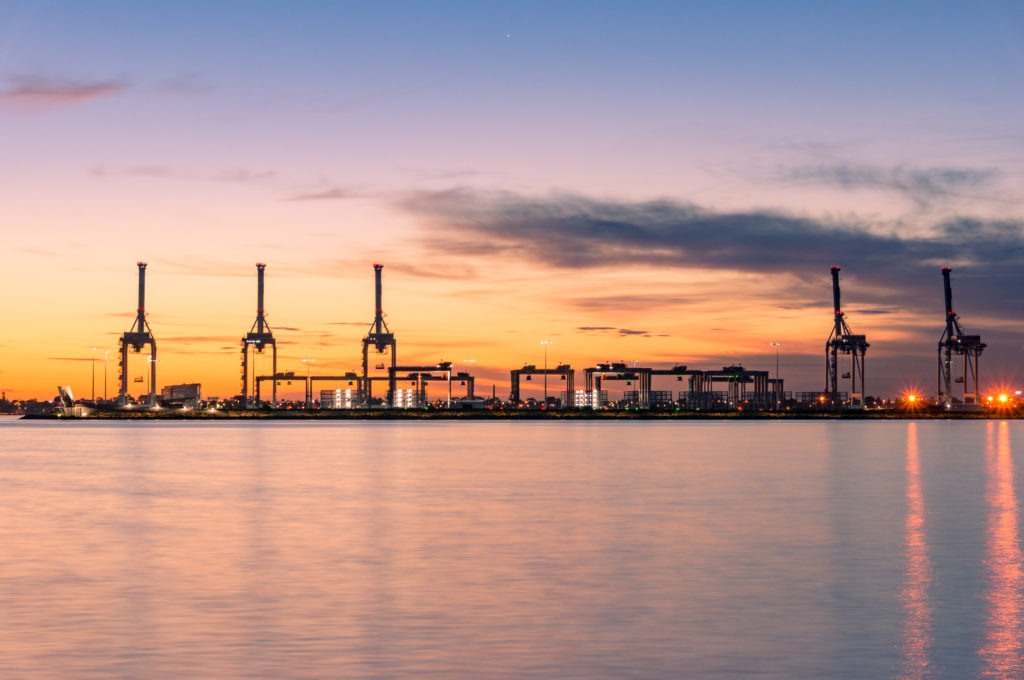As an island nation, Australia has always relied heavily on its ports, their wharves and other facilities as well as the associated land–side infrastructure including rail and road access, stevedore operations and empty container parks. Much of the national and international supply chain relies on the efficient operation of the sector.
The ownership, control and operation of all parts of the sector have occasionally been the subject of celebrated disputes and controversies, reflecting the importance of the sector. Government control of the sector operates at national, state and local government levels and ranges from border controls for customs and biosecurity, through to ownership of parts of the sector and competition regulation of parties operating in the sector through to the way in which occupational health and safety and environmental concerns are addressed.
It is in the interests of all parties in the sector and those in the other parts of the supply chain that trade is facilitated through the ports in the best possible manner without compromising border controls and other interests of the various levels of government. That also needs to recognise the legitimate financial interests of the private sector. Consequently, the interests of the private sector and the interests of government and its regulators may occasionally be in opposition. Indeed, even those in the private sector regularly have differences of opinion which are often pursued in public forums.
The importance of the sector is reflected by the regular reviews conducted by government and its agencies, even when they have no direct controls over the relevant parts of the sector or do not wish to exercise controls. One example is the annual container stevedoring monitoring report undertaken by the Australian Competition and Consumer Commission (ACCC). At the state level, Victoria has been active in reviewing the sector including the recent Coastal Shipping Review and Port Pricing and Access Review undertaken by Deloitte as commissioned by the Victorian State Government. Of course, Victoria has additional issues as the Port of Melbourne was the first Australian port to be privatised by the sale of the long – term lease.
Given these issues, the Victorian Government has now announced the initiation of a new independent review (Review) of the operation of all Victorian ports including the smaller ports. Details of the Review can be found here.
According to the “FAQs” associated with notice of the Review.
The Review will deliver a refreshed vision, options and directions to develop Victoria’s port sector and provide a framework for consideration of a range of matters, including:
-
future governance structure of the State-owned commercial and local port bodies;
-
price regulation and the role of competition in the ports sector;
-
the effectiveness of safety regulatory arrangements;
-
strategic planning and protection of the ports;
-
coastal shipping; and
-
port sector engagement.
In response to the anticipated question as to why the Review would be required in light of various recent reviews of some aspects of the sector, the Government has also stated in its “FAQs” that;
A comprehensive review of the sector has not been undertaken since 2001. Since that time there have been significant changes in the external and internal operating environments for the ports.
These include:
-
reduced rates of trade growth (particularly containerised) since the Global Financial Crisis in 2008;
-
the completion of the Channel Deepening Project in 2009;
-
the engagement of a third stevedore in the Port of Melbourne in 2014;
-
the long term lease of the Port of Melbourne to a private operator in 2016; and
-
further work to assess the options for a second container port in 2017, identifying Bay West as a likely location.
The current Review will take a holistic approach, enabling a reset of the vision, policy and governance settings for the ports sector and providing a contemporary context to progress the outcomes of the more specific Review projects.
The Government has also issued a Discussion Paper to assist the Review here and is seeking preliminary submissions in writing or by way of a response to a survey by 31 July 2020. Of specific interest, the FAQs indicate that parties can still press the issue of infrastructure access fee notwithstanding the recent review of that issue which suggested that, at that point, there was not a compelling case for direct control of those access fees. Hopefully, interested parties will continue their engagement through the Review as well as with other initiatives being undertaken by State and Federal governments including work at the National Committee on Trade Facilitation. I am looking forward to working with the International Forwarders and Customs Brokers Association of Australia (IFCBAA) on the Review leveraging recent work with the Customs Brokers and Forwarders Council of Australia (CBFCA) on the Victorian Coastal Shipping Review and the Port Pricing and Access Review. At the national level, I think that there is real merit in looking at establishing one agency to deal with port and related issues such as the Federal Maritime Commission (Federal Maritime Commission website) in the United States. That may assist in bringing all relevant issues into one central agency.
Please do not hesitate to contact our Customs and Trade team.
| Disclaimer: This publication contains comments of a general nature only and is provided as an information service. It is not intended to be relied upon as, nor is it a substitute for specific professional advice. No responsibility can be accepted by Rigby Cooke Lawyers or the authors for loss occasioned to any person doing anything as a result of any material in this publication.
Liability limited by a scheme approved under Professional Standards Legislation. ©2020 Rigby Cooke Lawyers |
